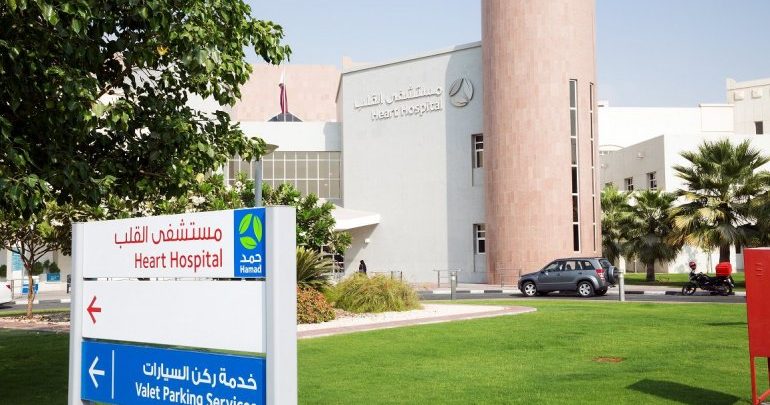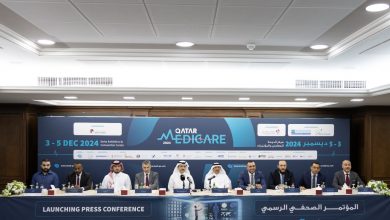
Heart Hospital exceeds global standards in treatment of heart attack patients
نتائج تفوق المعايير الدولية في علاج مرضى النوبات القلبية بـ «حمد الطبية»
Doha: Each year Hamad Medical Corporation’s (HMC) Heart Hospital performs more than 1,000 acute coronary surgeries on patients with a ST-Elevation Myocardial Infarction (STEMI), commonly known as a heart attack. Worldwide the condition is a leading cause of death and Heart Hospital’s treatment of these patients exceeds international benchmarks.
“What differentiates Heart Hospital from other hospitals meeting the international benchmark is the fact that we are able to achieve the best international standards despite having very high numbers of patients compared to other cardiology hospitals. Our high-quality care is achieved not only because we have a state-of-the-art facility but more importantly because we have highly trained and experienced staff,” said Dr Abdulrahman Arabi, Deputy Chair of Cardiology for Clinical Affairs and Director of the Cardiac Catheterization Laboratory at Heart Hospital.
A STEMI is a serious type of heart attack during which one of the heart’s major arteries is blocked. The international ‘door to balloon’ benchmark (the time that elapses from the patient’s arrival time at the hospital to the time the blocked artery is opened) is 90 minutes. At Heart Hospital, it is around 60 minutes.
“ST-Elevation Myocardial Infarction is the most serious of all types of acute coronary problems. Once a case is suspected, the ambulance paramedics will obtain the patient’s electrocardiogram while still in their home or workplace, or wherever the incident occurred. The ECG is then wire-transferred immediately to Heart Hospital and if the case is confirmed, the Cath Lab will be informed and the team will be ready to perform angioplasty immediately. This life-saving procedure is done within an average time of 60 minutes from arrival,” said Dr Arabi.
The priority in treating a STEMI heart attack is to open the artery quickly, saving as much heart muscle as possible. Dr Arabi said an angioplasty, which involves inserting a balloon-tipped catheter to unclog the vessel, is performed to restore blood flow through the artery.
“After the procedure, the patient will stay in the hospital for three to five days and then be discharged home,” said Dr Arabi. Coronary artery disease (narrowing of the arteries) is a type of cardiovascular disease which includes conditions that affect the structures or function of the heart. It remains the most prevalent form of heart disease in Qatar. More than 90 percent of the 4,000 heart-related procedures performed at Heart Hospital’s Cath Lab each year are related to coronary artery disease.
Dr Arabi said controlling the risk factors for coronary artery disease by getting enough exercise, quitting smoking, making heart-healthy nutrition choices, and reducing stress are essential.
يُجري مستشفى القلب التابع لمؤسسة حمد الطبية، سنوياً، ما يزيد على 1000 عملية جراحية في القلب لمرضى يعانون من احتشاء عضلة القلب، والذي يُعرف بالنوبة القلبية، حيث نجح مستشفى القلب في تقديم العلاج لهؤلاء المرضى بصورة تفوق المعايير الدولية.
ويقول الدكتور عبدالرحمن عربي، نائب رئيس قسم القلب للشؤون الطبية ومدير مختبرات القسطرة بمستشفى القلب: «إن ما يميّز مستشفى القلب عن غيره من المستشفيات الأخرى هو تطبيق أفضل المعايير الدولية، على الرغم من ارتفاع عدد الحالات بالمقارنة مع مستشفيات القلب الأخرى».
ويضيف أن الفضل في توفير رعاية تمتاز بالجودة العالية للمرضى لا يعود لتوظيف أفضل المعدّات الطبية في المستشفى فحسب، بل أيضاً لامتلاكنا الخبرات والكفاءات الطبية التي ترقى إلى مستوى عالٍ من التدريب.
ويُعرف مرض احتشاء عضلة القلب بأنه نوع خطير من أنواع النوبات القلبية، يحدث نتيجة انسداد أحد الشرايين الرئيسية في القلب. وقد نجح مستشفى القلب في تحقيق معدل 60 دقيقة لمتوسط المدة منذ وصول المريض إلى المستشفى وحتى إجراء عملية فتح الشريان أو ما يُعرف بالبالون، وهي واحدة من المعايير الدولية لعلاج انسداد الشرايين، وينبغي إجراؤها خلال 90 دقيقة في المتوسط، بينما يستغرق إجراؤها بمستشفى القلب 60 دقيقة فقط.
ويضيف الدكتور عربي بالقول: «مرض احتشاء عضلة القلب هو من أكثر أمراض القلب خطورة. ففي اللحظة التي يُشتبه فيها بحدوث نوبة قلبية، يقوم المسعفون بإجراء تخطيط للقلب في المكان الذي يكون فيه المريض، سواء في المنزل أو في المكتب أو أي مكان آخر».
ويُعدّ مرض تضيّق الشريان التاجي أو تضيّق الشرايين، أحد أمراض القلب التي تؤثر على عمل القلب، وهو أحد أكثر أمراض القلب انتشاراً في قطر. وتشكّل نسبة العمليات الجراحية التي تُجرى في مختبر القسطرة بمستشفى القلب والمرتبطة بحالات تضيّق الشرايين 90 % من مجموع العمليات التي يصل عددها إلى 4000 عملية جراحية.



